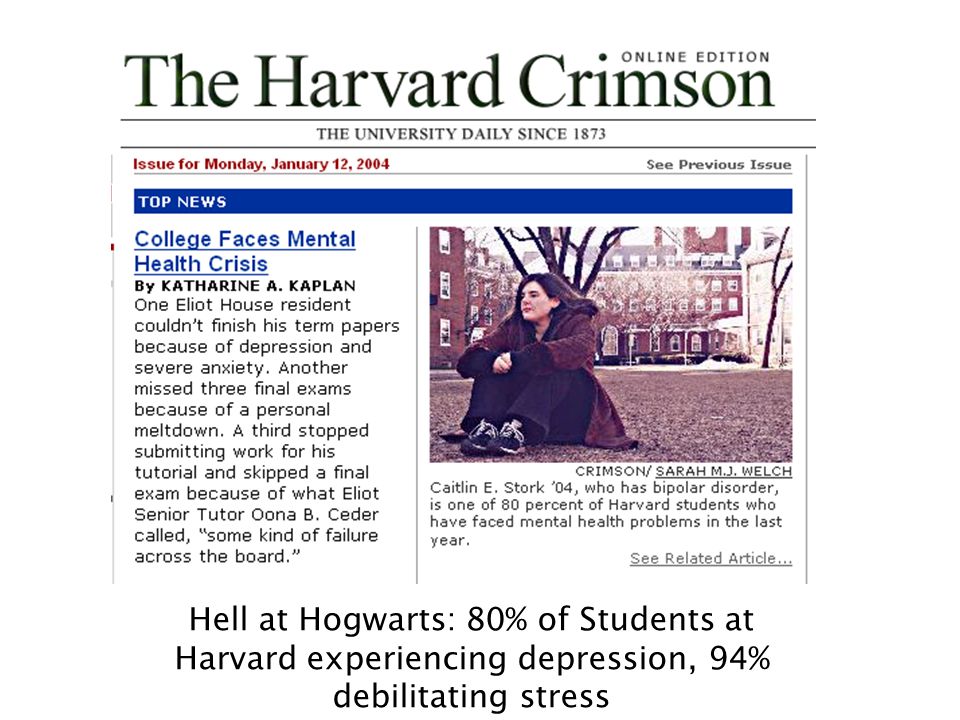Menu


Today’s post I believe is very important and revealing. I hope you will share it with those you know who might find it of interest. Before I start, I would like to define the word “microcosm.” The simplest definition is “something that is seen as a small version of something much larger.” I hope to point out how Harvard, the great educational institution, is a small version of what is happening in Western Culture.
The content of this blog comes from a presentation I made back in the fall titled “The Search for Meaning in a Chaotic World.” Up front, I need to say I have no ax to grind with Harvard. I stumbled upon this idea from two books I had read. The first is:The Question of God by Armand Nicholi, a professor of psychiatry at Harvard Medical School. Dr. Nicholi also taught a popular undergraduate level course there for 35 years. The second book was Finding God Beyond Harvard by Kelly Kullberg, who founded the Veritas Forum at Harvard, where she served as somewhat of a chaplain to students.
For many years Harvard was a spiritually vibrant place.
Harvard was founded in 1636. One of its central bylaws read:
“Let every student be plainly instructed, and earnestly pressed, to consider well (that) the main end of his life and studies is to know God and Jesus Christ which is eternal life, and therefore to lay Christ in the bottom, as the only foundation of all sound knowledge and learning.”
For many years Harvard was a spiritually vibrant place. In fact, many would say this was the foundation that lead to its initial greatness as an educational institution.
That has all changed. It seems today that Jesus has been expelled from the institution. In 1985, when Henri Nouwen resigned from Harvard Divinity School, he described the place as a spiritual desert, that God was dead at Harvard, even at the divinity school.
In February of 1993, Billy Graham had a lengthy meeting with Harvard’s president, Derek Bok. As Graham was leaving he asked Bok one last question, “What is the number one struggle the students at Harvard have to contend with.” Bok did not have to give it much thought as he quickly responded “Living with emptiness.”
Upon hearing this, Kelly Kullberg asked the question: “How did such a great institution like Harvard become a place of emptiness?”
Armand Nicholi would often ask his class of undergraduates if they and the people around them were happy. He says invariably they answered “No.” When he asked them why they found their lives to be so unhappy, they generally responded it was because of a lack of meaning in their lives and relationships.
Kelly Kullberg shares a shocking incident upon attempting to reach out and minister to some of the women at Harvard Divinity School. She attended a meeting that was held in the University Chapel. It was for women only and was called the “Full Moon Circle.” The group described themselves as a Neo-pagan, pre-Christian, Eco-feminist Wiccan Society. Of course, Wiccan Societies practice witchcraft.
Kullberg says the chapel was packed and the women chanted to the spirits, worshipped the full moon and many attempted to reach their dead ancestors.
80% of the student body had experienced depression at least once during the school year
In 2004, the cover story of the student newspaper “The Crimson” revealed the rampant incidence of student depression. Harvard has a student enrollment of 6,700 students. The newspaper reported that 80% of the student body had experienced depression at least once during the school year. Almost half (47%) of the student body found themselves depressed to the point of having a hard time functioning, and 10%, 650 students, had strongly considered committing suicide.
Nobel Prize winning French Novelist Albert Camus said, “There is but one truly philosophical problem, and that is suicide. Judging whether life is worth living amounts to answering the fundamental question of philosophy.” Camus saw many people take their lives because they saw life to be meaningless and therefore not worth living.
Thomas Masaryk, the first president of liberated Czechoslovakia after World War I, wrote a book entitled Suicide and the Meaning of Civilization. The thesis of the book is that the more godless a society becomes, the higher the rate of suicide. His research suggested that in the middle ages, the number of suicides was negligible. However, by the end of the nineteenth century, it was evident that suicide had become one of the top causes of death. Today, suicide has surpassed car crashes as the leading cause of death due to injury. Furthermore, Masaryk uncovered the fact that the vast majority of these deaths occurred among highly principled, well-educated people who had no religious faith. His conclusion reveals the tragic story of those individuals who can find no purpose in life and therefore have no reason to live.
In order to find meaning, you have to look to God to answer the significant questions of life. These questions concern our place and purpose in the world, the significance of our lives, and our ultimate destiny. So many people have moved away from the Biblical worldview that has always supplied the answers to these questions. However, the questions have not gone away and they never will, and modern man is therefore left all alone, disconnected from the One who gives life meaning.
Add grace and understanding to your day with words from Richard E. Simmons III in your inbox. Sign-up for weekly email with the latest blog post, podcast, and quote.

For local orders in the Birmingham, AL area, enter Promo Code LOCAL at checkout to save shipping. We will email you when your order is ready for pickup.
Bulk discounts for 25 or more books! Call 205-789-3471 for prices.